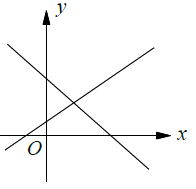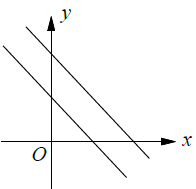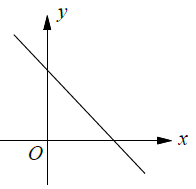SOLVING SYSTEM OF EQUATIONS SPECIAL CASES
Subscribe to our ▶️ YouTube channel 🔴 for the latest videos, updates, and tips.
A set of linear equations with the same two variables is called a system of linear equations.
The system of linear equations can have the following solutions.
(i) Unique solutions
(ii) No solution
(iii) Infinitely many solution
Unique solution :
Intersecting lines will have one solution (or) unique solution.

The point of intersection is known as solution.
No solution :
The parallel lines will never meet. So, there is no point of intersection that is no solution.

Parallel lines will have the same slope but different y-intercepts.
Infinitely many solution :
Two lines that lie exactly on top of each other or we can say that one line is exactly lying on top of another line are called coincident lines.

Coincident lines will have the same slope and same y-intercepts.
Problem 1 :
x - 3y = 4
2(x - 1) - 6(y + 2) = -6
How many solutions (x, y) are there to the system of equations above ?
(a) Zero (b) One (c) Two (d) More than two
Solution :
x - 3y = 4 ----(1)
Using distributive property, we get
2(x - 1) - 6(y + 2) = -6
2x - 2 - 6y - 12 = -6
2x - 6y - 14 = -6
2x - 6y = -6 + 14
2x - 6y = 8 ----(2)
|
From (1) x - 3y = 4 3y = x - 4 y = (1/3)x - (4/3) m1 = 1/3 y-intercept = -4/3 |
From (2) 2x - 6y = 8 6y = 2x - 8 y = (2/6)x - (8/6) m2 = 1/3 y-intercept = -4/3 |
Since slopes and y-intercepts are equal, then both are coincident lines and they will have many solutions.
So, more than two solution is the correct answer.
Problem 2 :
ax + 4y = 14
5x + 7y = 8
In the system of equations above, a is a constant and x and y are variables. If the system has no solution, what is the value of a ?
(a) 20/7 (b) -35/4 (c) 35/4 (d) - 20/7
Solution :
ax + 4y = 14 ---(1)
5x + 7y = 8 ---(2)
|
Slope from (1) : 4y = -ax + 14 y = (-a/4)x + (14/4) y = (-a/4)x + (7/2) m1 = -a/4 |
Slope from (2) : 7y = -5x + 8 y = (-5/7)x + (8/7) m2 = -5/7 |
By equating the slopes, we get
-a/4 = -5/7
a = (5⋅4)/7
a = 20/7
Problem 3 :
ax + (1/2)y = 16
4x + 3y = 8
In the system of equations above, a is constant. If the system has no solution, what is the value of a ?
(a) 2/3 (b) 8 (c) 8 (d) 24
Solution :
ax + (1/2)y = 16 ----(1)
4x + 3y = 8 ----(2)
|
Slope intercept from (1) : (1/2)y = -ax + 16 y = -2ax + 32 m1 = -2a |
Slope intercept from (2) : 3y = -4x + 8 y = (-4/3)x + 8/3 m2 = -4/3 |
Equating the slopes, we get
-2a = -4/3
a = 2/3
Problem 4 :
3x + ky = 8
x + 4y = -1
If (x, y) is a solution to the system of equations above and k is constant, what is y in terms of k ?
(a) 5/(k - 12) (b) 5/(k - 12) (c) 11/(k - 12) (d) 9/(k-4)
Solution :
3x + ky = 8 ------(1)
x + 4y = -1 ------(2)
To solve for y, we have to eliminate x.
(1) - 3(2)
3x + ky - 3x - 12y = 8 + 3
y(k - 12) = 11
y = 11/(k - 12)
Problem 5 :
x/(y + 2) = 2
3(y - 5) - x = -16
If (x, y) is the solution to the system of equations above, what is the value of x ?
Solution :
x/(y + 2) = 2 -----(1)
3(y - 5) - x = -16 -----(2)
From (1)
x = 2(y + 2)
x = 2y + 4 -----(3)
From (2)
3y - 15 - x = -16
3y + 16 - 15 = x
x = 3y + 1-----(4)
3(3) - 2(4)
3x - 2x = 3(2y + 4) - 2(3y + 1)
x = 6y + 12 - 6y - 2
x = 10
Problem 6 :
-2x - y = -9
5x - 2y = 18
Which of the following ordered pairs (x, y) fulfills the system of equations above ?
(a) (-4, 1) (b) (3, 3) (c) (2, 5) (d) (4, 1)
Solution :
-2x - y = -9 -----(1)
5x - 2y = 18 -----(2)
Multiply the first equation by 2 and subtract it with second equation.
2(1) - (2)
-4x - 2y - (5x - 2y) = -18 - 18
-4x - 2y - 5x + 2y = -36
-9x = -36
Divide by -9 on both sides.
x = -36/(-9)
x = 4
By applying the value of x in (1), we get
-2(4) - y = -9
-8 - y = -9
y = -8 + 9
y = 1
So, the solution is (4, 1).
Problem 7 :
-3x + 2y = 5
-9x + 6y = 18
The system of equations above has how many solutions (x, y)
(a) Zero (b) Two (c) One (d) More than two
Solution :
-3x + 2y = 5 -----(1)
-9x + 6y = 18 -----(2)
|
From (1) 2y = 3x + 5 y = (3/2)x + (5/3) m1 = 3/2 y-intercept = 5/3 |
From (2) 6y = 9x + 18 y = (9/6)x + (18/6) m2 = 3/2 y-intercept = 3 |
Slopes are same, but it has different y-intercepts. Then both lines are parallel and it has no solution.
So, the answer is zero solution.
Subscribe to our ▶️ YouTube channel 🔴 for the latest videos, updates, and tips.
Recent Articles
-
Finding Range of Values Inequality Problems
May 21, 24 08:51 PM
Finding Range of Values Inequality Problems -
Solving Two Step Inequality Word Problems
May 21, 24 08:51 AM
Solving Two Step Inequality Word Problems -
Exponential Function Context and Data Modeling
May 20, 24 10:45 PM
Exponential Function Context and Data Modeling